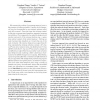Free Online Productivity Tools
i2Speak
i2Symbol
i2OCR
iTex2Img
iWeb2Print
iWeb2Shot
i2Type
iPdf2Split
iPdf2Merge
i2Bopomofo
i2Arabic
i2Style
i2Image
i2PDF
iLatex2Rtf
Sci2ools
217
click to vote
ICDE
2002
IEEE
2002
IEEE
Efficient Temporal Join Processing Using Indices
We examine the problem of processing temporal joins in the presence of indexing schemes. Previous work on temporal joins has concentrated on non-indexed relations which were fully scanned. Given the large data volumes created by the ever increasing time dimension, sequential scanning is prohibitive. This is especially true when the temporal join involves only parts of the joining relations (e.g., a given time interval instead of the whole timeline). Utilizing an index becomes then beneficial as it directs the join to the data of interest. We consider temporal join algorithms for three representative indexing schemes, namely a B+-tree, an R*-tree and a temporal index, the Multiversion B+-tree (MVBT). Both the B+-tree and R*-tree result in simple but not efficient join algorithms because neither index achieves good temporal data clustering. Better clustering is maintained by the MVBT through record copying. Nevertheless, copies can greatly affect the correctness and effectiveness of the...
Related Content
| Added | 01 Nov 2009 |
| Updated | 01 Nov 2009 |
| Type | Conference |
| Year | 2002 |
| Where | ICDE |
| Authors | Donghui Zhang, Vassilis J. Tsotras, Bernhard Seeger |
Comments (0)

